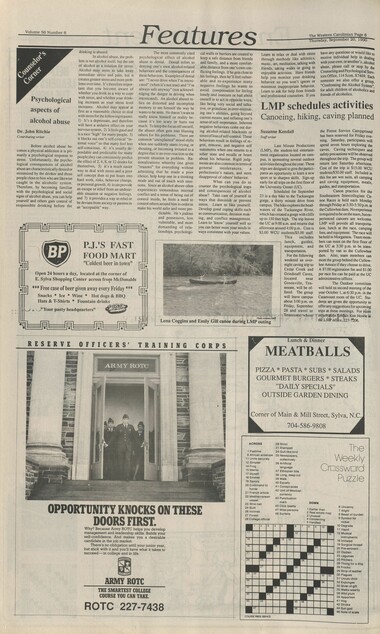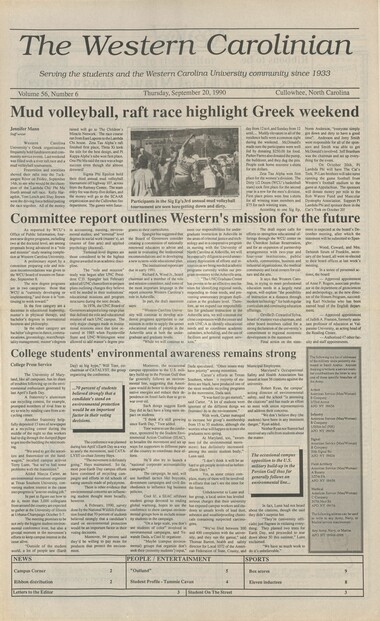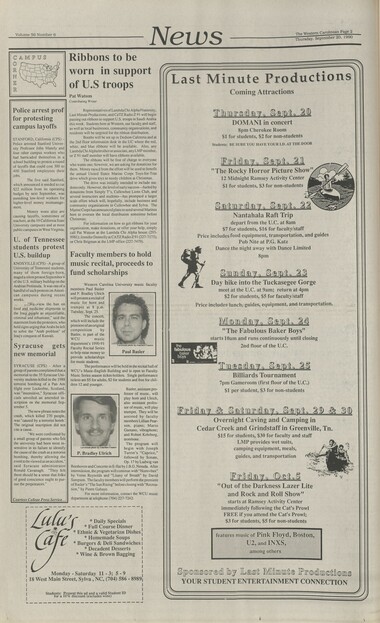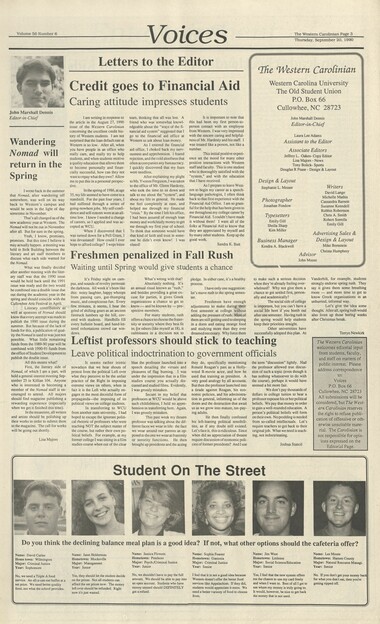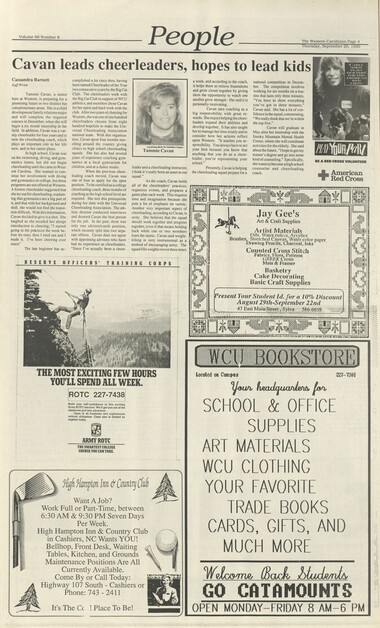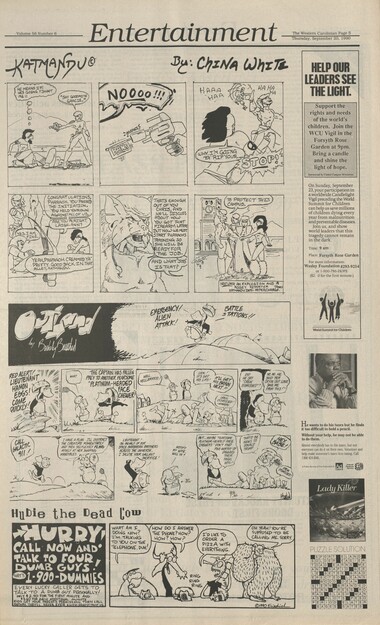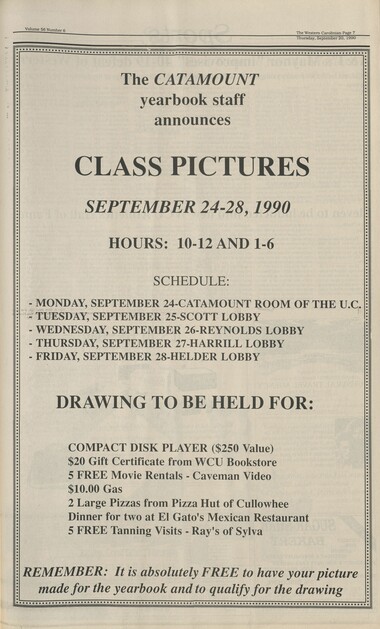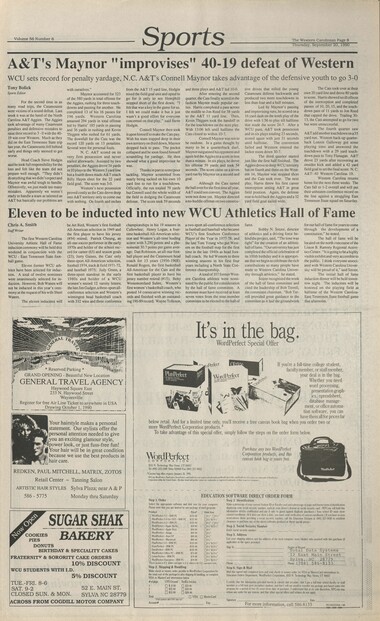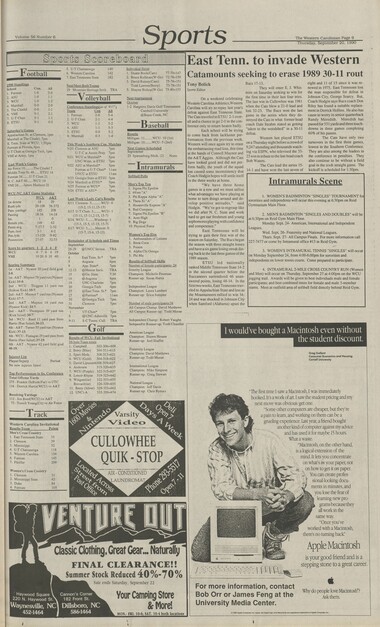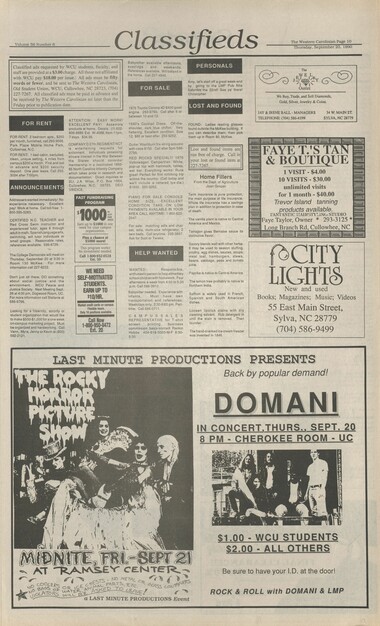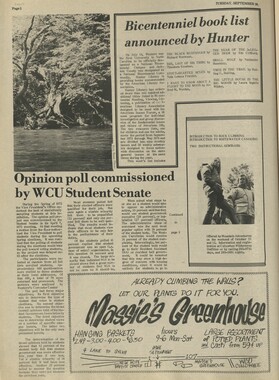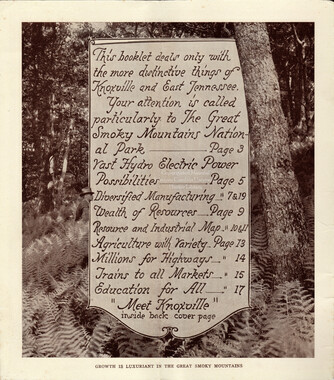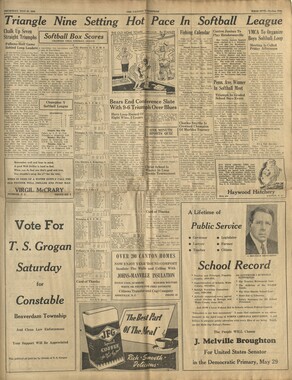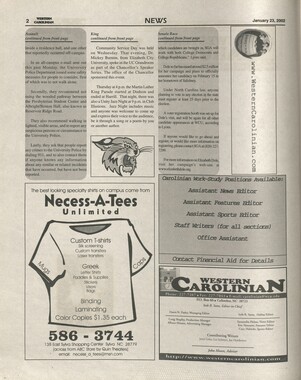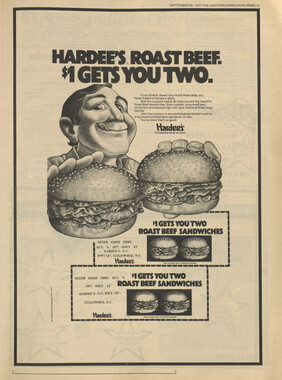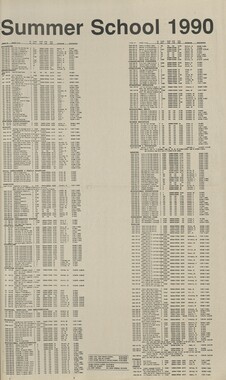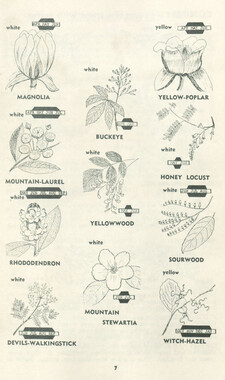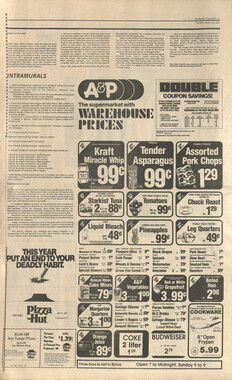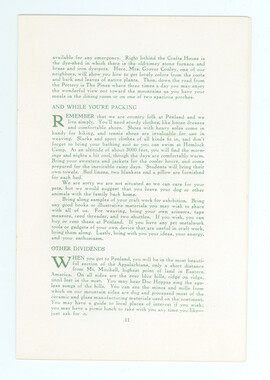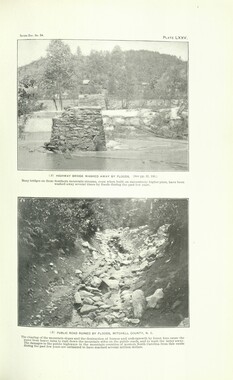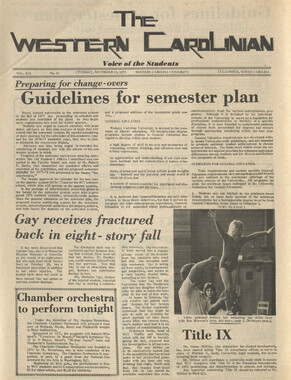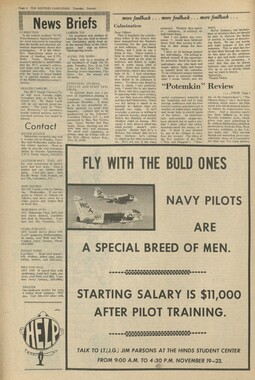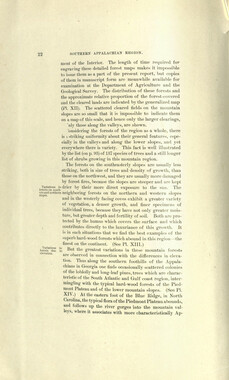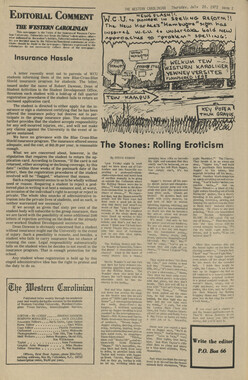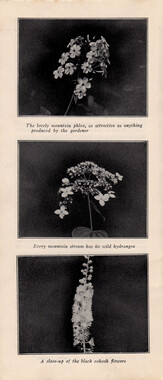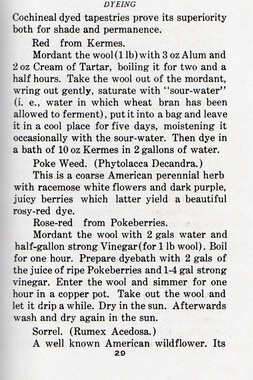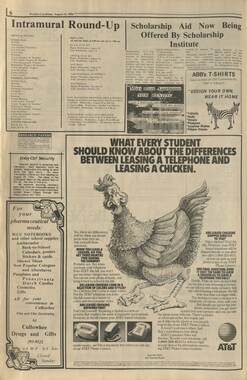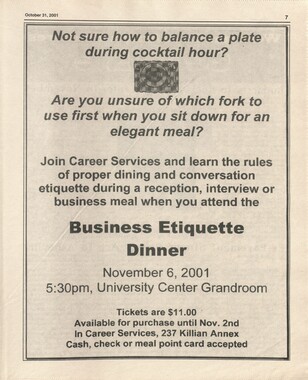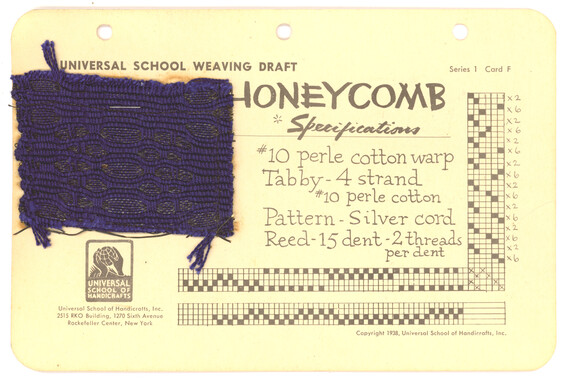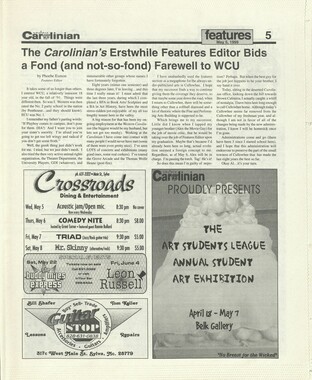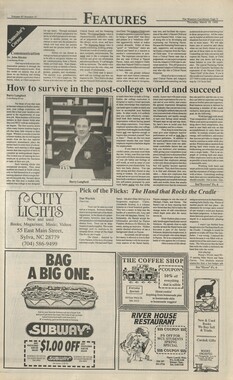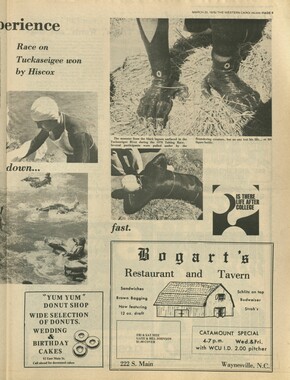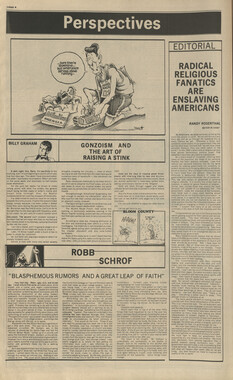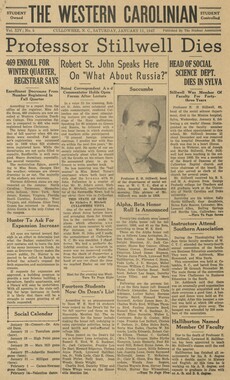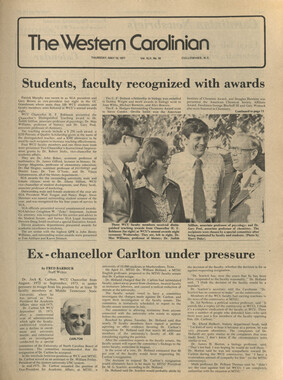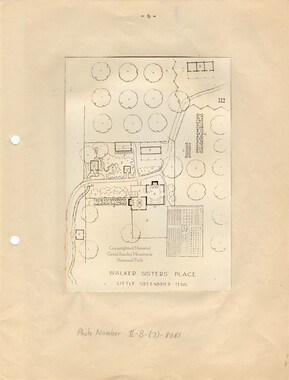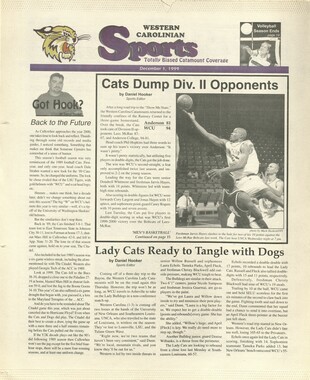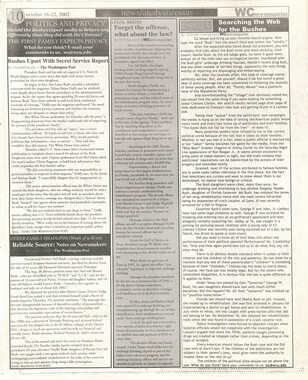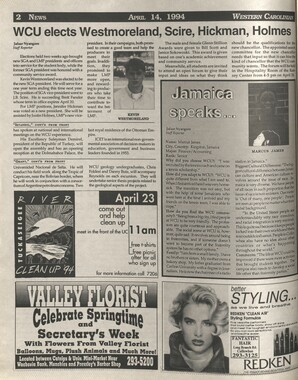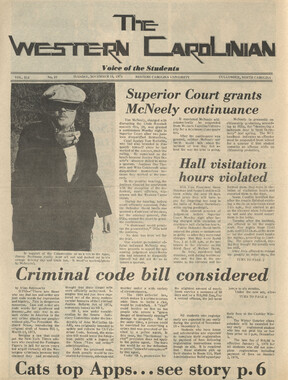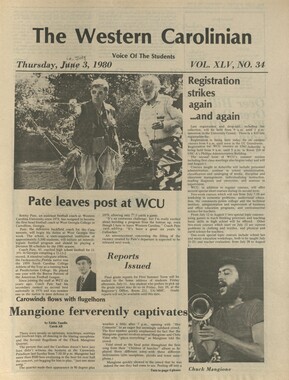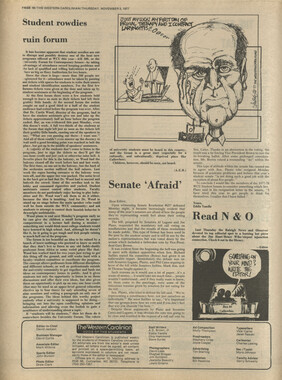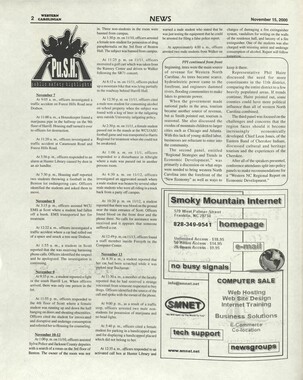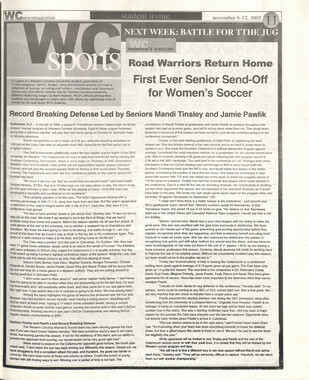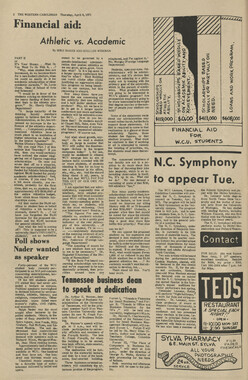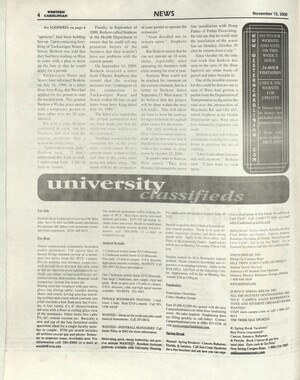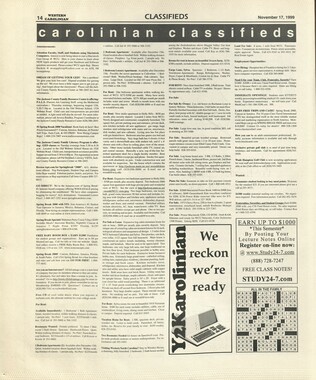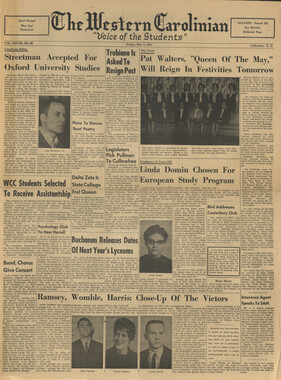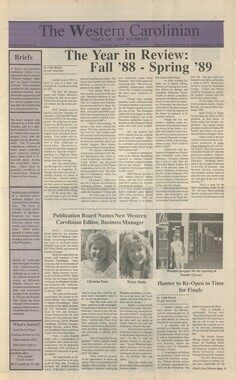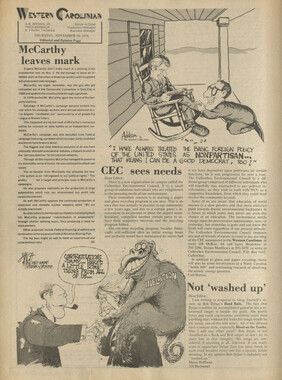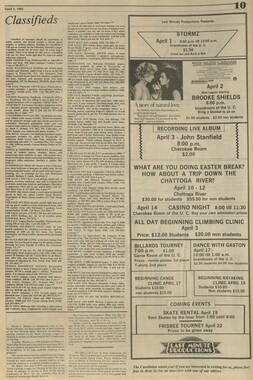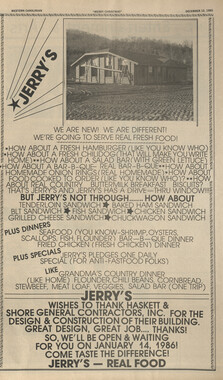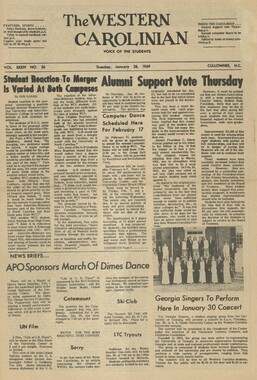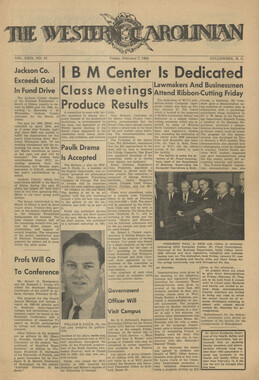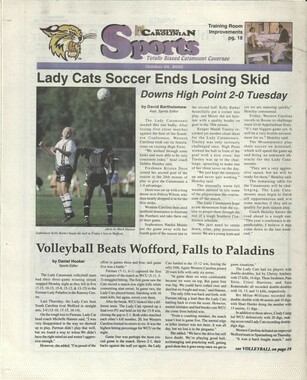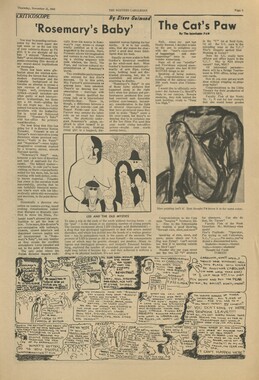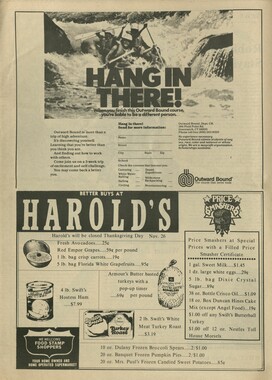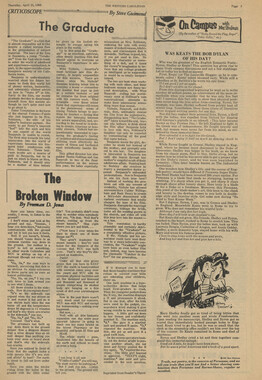Western Carolina University (20)
View all
- Canton Champion Fibre Company (2308)
- Cherokee Traditions (292)
- Civil War in Southern Appalachia (165)
- Craft Revival (1942)
- Great Smoky Mountains - A Park for America (2766)
- Highlights from Western Carolina University (430)
- Horace Kephart (941)
- Journeys Through Jackson (154)
- LGBTQIA+ Archive of Jackson County (85)
- Oral Histories of Western North Carolina (314)
- Picturing Appalachia (6772)
- Stories of Mountain Folk (413)
- Travel Western North Carolina (160)
- Western Carolina University Fine Art Museum Vitreograph Collection (129)
- Western Carolina University Herbarium (92)
- Western Carolina University: Making Memories (708)
- Western Carolina University Publications (2283)
- Western Carolina University Restricted Electronic Theses and Dissertations (146)
- Western North Carolina Regional Maps (71)
- World War II in Southern Appalachia (131)
University of North Carolina Asheville (6)
View all
- Allanstand Cottage Industries (62)
- Appalachian National Park Association (53)
- Bennett, Kelly, 1890-1974 (1388)
- Berry, Walter (76)
- Brasstown Carvers (40)
- Carver, George Washington, 1864?-1943 (26)
- Cathey, Joseph, 1803-1874 (1)
- Champion Fibre Company (233)
- Champion Paper and Fibre Company (297)
- Cherokee Indian Fair Association (16)
- Cherokee Language Program (22)
- Crowe, Amanda (40)
- Edmonston, Thomas Benton, 1842-1907 (7)
- Ensley, A. L. (Abraham Lincoln), 1865-1948 (275)
- Fromer, Irving Rhodes, 1913-1994 (70)
- George Butz (BFS 1907) (46)
- Goodrich, Frances Louisa (120)
- Grant, George Alexander, 1891-1964 (96)
- Heard, Marian Gladys (60)
- Kephart, Calvin, 1883-1969 (15)
- Kephart, Horace, 1862-1931 (313)
- Kephart, Laura, 1862-1954 (39)
- Laney, Gideon Thomas, 1889-1976 (439)
- Masa, George, 1881-1933 (61)
- McElhinney, William Julian, 1896-1953 (44)
- Niggli, Josephina, 1910-1983 (10)
- North Carolina Park Commission (105)
- Osborne, Kezia Stradley (9)
- Owens, Samuel Robert, 1918-1995 (11)
- Penland Weavers and Potters (36)
- Roberts, Vivienne (15)
- Roth, Albert, 1890-1974 (142)
- Schenck, Carl Alwin, 1868-1955 (1)
- Sherrill's Photography Studio (2565)
- Southern Highland Handicraft Guild (127)
- Southern Highlanders, Inc. (71)
- Stalcup, Jesse Bryson (46)
- Stearns, I. K. (213)
- Thompson, James Edward, 1880-1976 (226)
- United States. Indian Arts and Crafts Board (130)
- USFS (683)
- Vance, Zebulon Baird, 1830-1894 (1)
- Weaver, Zebulon, 1872-1948 (58)
- Western Carolina College (230)
- Western Carolina Teachers College (282)
- Western Carolina University (1794)
- Western Carolina University. Mountain Heritage Center (18)
- Whitman, Walt, 1819-1892 (10)
- Wilburn, Hiram Coleman, 1880-1967 (73)
- Williams, Isadora (3)
- Cain, Doreyl Ammons (0)
- Crittenden, Lorraine (0)
- Rhodes, Judy (0)
- Smith, Edward Clark (0)
- Appalachian Region, Southern (2569)
- Asheville (N.C.) (1923)
- Avery County (N.C.) (26)
- Blount County (Tenn.) (161)
- Buncombe County (N.C.) (1672)
- Cherokee County (N.C.) (283)
- Clay County (N.C.) (555)
- Graham County (N.C.) (233)
- Great Smoky Mountains National Park (N.C. and Tenn.) (519)
- Haywood County (N.C.) (3524)
- Henderson County (N.C.) (70)
- Jackson County (N.C.) (4694)
- Knox County (Tenn.) (25)
- Knoxville (Tenn.) (12)
- Lake Santeetlah (N.C.) (10)
- Macon County (N.C.) (420)
- Madison County (N.C.) (212)
- McDowell County (N.C.) (39)
- Mitchell County (N.C.) (132)
- Polk County (N.C.) (35)
- Qualla Boundary (981)
- Rutherford County (N.C.) (76)
- Swain County (N.C.) (2115)
- Transylvania County (N.C.) (270)
- Watauga County (N.C.) (12)
- Waynesville (N.C.) (84)
- Yancey County (N.C.) (72)
- Aerial Photographs (3)
- Aerial Views (60)
- Albums (books) (4)
- Articles (1)
- Artifacts (object Genre) (228)
- Bibliographies (1)
- Biography (general Genre) (2)
- Cards (information Artifacts) (38)
- Clippings (information Artifacts) (191)
- Crafts (art Genres) (622)
- Depictions (visual Works) (21)
- Design Drawings (1)
- Drawings (visual Works) (184)
- Envelopes (73)
- Facsimiles (reproductions) (1)
- Fiction (general Genre) (4)
- Financial Records (12)
- Fliers (printed Matter) (67)
- Glass Plate Negatives (381)
- Guidebooks (2)
- Internegatives (10)
- Interviews (815)
- Land Surveys (102)
- Letters (correspondence) (1013)
- Manuscripts (documents) (618)
- Maps (documents) (177)
- Memorandums (25)
- Minutes (administrative Records) (59)
- Negatives (photographs) (5835)
- Newsletters (1285)
- Newspapers (2)
- Occupation Currency (1)
- Paintings (visual Works) (1)
- Pen And Ink Drawings (1)
- Periodicals (193)
- Personal Narratives (10)
- Photographs (12976)
- Plans (maps) (1)
- Poetry (6)
- Portraits (4533)
- Postcards (329)
- Programs (documents) (151)
- Publications (documents) (2236)
- Questionnaires (65)
- Scrapbooks (282)
- Sheet Music (2)
- Slides (photographs) (402)
- Songs (musical Compositions) (2)
- Sound Recordings (796)
- Specimens (92)
- Speeches (documents) (15)
- Tintypes (photographs) (8)
- Transcripts (322)
- Video Recordings (physical Artifacts) (23)
- Vitreographs (129)
- Text Messages (0)
- A.L. Ensley Collection (275)
- Appalachian Industrial School Records (7)
- Appalachian National Park Association Records (336)
- Axley-Meroney Collection (2)
- Bayard Wootten Photograph Collection (20)
- Bethel Rural Community Organization Collection (7)
- Blumer Collection (5)
- C.W. Slagle Collection (20)
- Canton Area Historical Museum (2110)
- Carlos C. Campbell Collection (282)
- Cataloochee History Project (64)
- Cherokee Studies Collection (4)
- Daisy Dame Photograph Album (5)
- Daniel Boone VI Collection (1)
- Doris Ulmann Photograph Collection (112)
- Elizabeth H. Lasley Collection (1)
- Elizabeth Woolworth Szold Fleharty Collection (4)
- Frank Fry Collection (95)
- George Masa Collection (173)
- Gideon Laney Collection (452)
- Hazel Scarborough Collection (2)
- Hiram C. Wilburn Papers (28)
- Historic Photographs Collection (236)
- Horace Kephart Collection (861)
- Humbard Collection (33)
- Hunter and Weaver Families Collection (1)
- I. D. Blumenthal Collection (4)
- Isadora Williams Collection (4)
- Jesse Bryson Stalcup Collection (47)
- Jim Thompson Collection (224)
- John B. Battle Collection (7)
- John C. Campbell Folk School Records (80)
- John Parris Collection (6)
- Judaculla Rock project (2)
- Kelly Bennett Collection (1407)
- Love Family Papers (11)
- Major Wiley Parris Civil War Letters (3)
- Map Collection (12)
- McFee-Misemer Civil War Letters (34)
- Mountain Heritage Center Collection (4)
- Norburn - Robertson - Thomson Families Collection (44)
- Pauline Hood Collection (7)
- Pre-Guild Collection (2)
- Qualla Arts and Crafts Mutual Collection (12)
- R.A. Romanes Collection (681)
- Rosser H. Taylor Collection (1)
- Samuel Robert Owens Collection (94)
- Sara Madison Collection (144)
- Sherrill Studio Photo Collection (2558)
- Smoky Mountains Hiking Club Collection (616)
- Stories of Mountain Folk - Radio Programs (374)
- The Reporter, Western Carolina University (510)
- Venoy and Elizabeth Reed Collection (16)
- WCU Gender and Sexuality Oral History Project (32)
- WCU Mountain Heritage Center Oral Histories (25)
- WCU Oral History Collection - Mountain People, Mountain Lives (71)
- WCU Students Newspapers Collection (1744)
- Western North Carolina Tomorrow Black Oral History Project (69)
- William Williams Stringfield Collection (2)
- Zebulon Weaver Collection (109)
- African Americans (390)
- Appalachian Trail (35)
- Artisans (521)
- Cherokee art (84)
- Cherokee artists -- North Carolina (10)
- Cherokee language (21)
- Cherokee pottery (101)
- Cherokee women (208)
- Church buildings (170)
- Civilian Conservation Corps (U.S.) (110)
- College student newspapers and periodicals (1830)
- Dams (107)
- Dance (1023)
- Education (222)
- Floods (61)
- Folk music (1015)
- Forced removal, 1813-1903 (2)
- Forest conservation (220)
- Forests and forestry (1184)
- Gender nonconformity (4)
- Great Smoky Mountains National Park (N.C. and Tenn.) (181)
- Hunting (38)
- Landscape photography (25)
- Logging (118)
- Maps (83)
- Mines and mineral resources (8)
- North Carolina -- Maps (18)
- Paper industry (38)
- Postcards (255)
- Pottery (135)
- Railroad trains (71)
- Rural electrification -- North Carolina, Western (3)
- School integration -- Southern States (2)
- Segregation -- North Carolina, Western (5)
- Slavery (5)
- Sports (452)
- Storytelling (244)
- Waterfalls -- Great Smoky Mountains (N.C. and Tenn.) (66)
- Weaving -- Appalachian Region, Southern (280)
- Wood-carving -- Appalachian Region, Southern (328)
- World War, 1939-1945 (173)
Western Carolinian Volume 56 Number 06
Item
Item’s are ‘child’ level descriptions to ‘parent’ objects, (e.g. one page of a whole book).
-
-
Volume 56 Number 6 Features Tn,» western Carolinian Page 6 "Thursday, September 20, 1990" Psychological aspects of alcohol abuse Dr. John Ritchie Contributing writer Before alcohol abuse becomes a physical addiction it is primarily a psychological response to stress. Unfortunately, the psychological consequences of alcohol abuse are characteristically denied or minimized by the drinker and those people close to him who are likewise caught in the alcoholic system. Therefore, by becoming familiar with the psychological and social signs of alcohol abuse, you can help yourself and others gain control of responsible drinking before the drinking is abused. In alcohol abuse, the problem is not alcohol itself, but the use of alcohol as a solution for stress. Alcohol may seem to take away immediate stress and pain, but it creates greater stress and more problems over time. It's therefore important that you become aware of whether you drink as a way to cope with stress, and whether your drinking increases as your stress level increases. Alcohol may appear at first as a reasonable choice to deal with stress for the following reasons: 1) It's a depressant, and therefore will have a sedative effect on your nervous system, 2) It feels good and is a nice "high" for many people, 3) it blocks out one's self-critical "internal voice" so that many feel less self-conscious, 4) it's usually dependable and predictable for many pcople;they can consistently predict the effect of 2,4,8, or 12 drinks for themselves, 5) it's a much easier way to deal with stress and a poor self concept than to put hours into hard work, risks, behavior change, or personal growth, 6) it can provide an escape or relief from an undesirable situation or negative feelings, and 7) it provides a way to rebel or be deviant from society or parents in an "acceptable" way. •J3 \ The most commonly cited psychological effect of alcohol abuse is denial. Denial refers to denying one's own alcohol-related behaviors and the consequences of these behaviors. Examples of denial are: "I never drive when I'm intoxicated" (when it's not true) and "I'm always safe anyway" (not acknowledging the danger in driving when intoxicated). An alcohol abuser relies on distorted and incomplete memory to see himself the way he wants to be seen. He doesn't want to really know himself or reality because it's too scary or hurts too much. To keep the focus off oneself, the abuser often gets into blaming others for his problems. There are common "unexplained" mood shifts when one suddenly starts crying, or shouting, or becoming irritated to a degree that is an over-reaction to the present situation or problem. Rationalizations whereby one gives "reasons" for everything without admitting that he made a poor choice, help keep one in a thinking mode and out of touch with emotions. Since an alcohol abuser often experiences tremendous internal conflict and a sense of being out of control inside, he feels a need to control others around him in order to make his world safer and more predictable. He's jealous and possessive, less vulnerable, and more demanding of relationships, psychologi- El« PJ.fS FAST FOOD MART "Coldest beer in town" Open 24 hours a day, located at the corner of E. S}1va Shopping Center across froni McDonalds *** Free case of beer given away every Friday *** Snacks * Ice * Wine * Hot dogs & BBQ Hats & T-Shirts * Fountain drinks • w"Your party headquarters" cal walls or barriers are created to keep a safe distance from friends and family, and a more comfortable distance from one's own conflicting feelings. If he gets close to his feelings, then he'll feel vulnerable and re-experience many negative feelings he wants to avoid, compensation for feeling lonely and insecure or bad about oneself is to act in opposite ways, like being very social and talkative, or grandiose in over-estimating one's abilities, going beyond current means, and inflating one's sense of self-importance. Inherent negative behaviors come out during alcohol-related blackouts or times of loss of self-control. These behaviors result in feelings of regret, remorse, and negative self statements when one returns to a sober state and recalls or hears about his behavior. Rigid judgments are also common in terms of general intolerances, a perfectionist's nature, and stem disapproval of others' behavior. What can you do to counter the psychological traps and consequences of alcohol abuse? Take care of yourself in ways that diminish or prevent stress. Learn to like yourself. Develop good coping skills such as communication, decision making, and conflict management. Leant to 'know' yourself well so you can better meet your needs in ways consistent with your values. Learn to relax or deal with stress through methods like athletics, music, art, meditation, talking with friends, taking walks or going to enjoyable activities. Have friends help you monitor your drinking behavior so you won't ignore or minimize inappropriate behavior. Learn to ask for help from friends and professional counselors. If you have any questions or would like to receive individual help in dealing with your own, or another's, alcohol abuse, please call or stop by the Counseling and Psychological Serv- ices Office, 114 Scott, X7469. Each semester we also offer a group) "Confronting the Alcohol System"! for adult children of alcoholics and friends of alcoholics. LMP schedules activities Canoeing, hiking, caving planned Suzanne Kendall Staff writer Last Minute Productions (LMP), the student-led entertainment organization located on campus, is sponsoring several outdoor activities throughout the year. These trips are designed to give the participants an opportunity to learn a new sport or to sharpen skills. Sign-up early for all trips on the first floor of the University Center (UC). Scheduled for September 23 is a day hike to the Tuckasegee gorge, a thirty minute drive from campus. The hike explores the headwaters of the Tuckasegee River, which has created a gorge with cliffs up to 150 feet high. The trip leaves the UC at 9:00 a.m. and returns that afternoon around 4:00 p.m.. Cost is $2.00 WCU students/$5.00 staff. This includes lunch, guides, equipment, and transportation. For the following weekend an overnight caving trip to Cedar Creek and Grindstaff Caves, located near Greenville, Tennessee, will be offered. The group will leave campus about 3:00 p.m. on Friday, September 28 and travel to ^W Pholo comrtsey LMP Lena Coggins and Emily Gill canoe during LMP outing the Forest Service Campground has been reserved for Friday evening. Saturday, participants will spend seven hours exploring the caves. Caving techniques and safety precautions will be observed throughout the trip. The group will return late Saturday afternoon. Cost of the trip is $15.00 WCU students/$30.00 staff. Included in this fee are wet suits, all camping and caving equipment, meals, guides, and transportation. Canoe practice for the Southeastern Intercollegiate Canoe Races is held each Monday through Friday at 3:30-5:30 p.m. at the Cullowhee dam. No experience is required to be on the team, but experienced canoers are welcome. LMP will provide all transportation, lunch at the race, camping fees, and equipment. The race will be held in Morganton. Team members can meet on the first floor of the UC at 3:30 p.m. to be transported by van to the Cullowhee dam. Also, team members can meet the group behind the Cullowhee Amoco if they choose to drive. A $7.00 registration fee and $1.00 per race fee can be paid at the UC administrative offices. The Outdoor committee will hold its second meeting of the year October 1, at 6:30 p.m. in the Catamount room of the UC. Students are given the opportunity to offer any suggestions for upcoming trips at these meetings. For more Tennessee where infbrffiJKi'$n^cfrTSict Ken Howie at the LMP 6ffie,227-7206. RESERVE OFFICERS' TRAINING CORPS r Lunch & Dinner Wwaffl?^ , ....... OPPORTUNITY KNOCKS ON THESE DOORS FIRST. Why? Because Army ROTC helps you develop management and leadership skills. Builds your self-confidence. And makes you a desirable candidate in the job market. There's no obligation until your junior year, but stick with it and you'll have what it takes to succeed—in college and in life. MEATBALLS PIZZA * PASTA * SUBS * SALADS GOURMET BURGERS * STEAKS "DAILY SPECIALS" OUTSIDE GARDEN DINING [corner of Main & Mill Street, Sylva, N.C, ^k 704-586-9808 ARMY ROTC THE SMARTEST COLLEGE COURSE YOU CAN TAKE. ROTC 227-7438 ACROSS 1 Pastime 6 African antelope 11 Unite securely 12 Simpler 14 Frog 15 Merits 17 Myself 18 Emmet 19 Savory 20 Command to horse 21 French article 22 Mediterranean vessel 23 Wire nail 24 Built 26 Inclines 27 Forest 28 College official 29 Strict 31 Stamped 34 Gull-like bird 35 Newspapers, collectively 36 Artificial language 37 Ethiopian title 38 Long, deep cut 39 Male 40 Equally 41 Conspiracies 42 Unit of Mexican currency 43 Punctuation mark 45 Click beetle 47 Wise persons 48 Surfeits The Weekly Crossword Puzzle DOWN 1 Earlier than 2 Real estate map 3 Unusual 4 Concerning 5 Handled ■ 2 3 4 5 1 6 7 8 9 10 11 12 13 14 _ ■ 15 ■ ■ 17 fl _ | M9 "W i\ ■ ™ !4 i ■ 1 . ™ | 1^ _ 1 w 34 | ■ 1 37 ■ 1 40 I 1 7 r U 44 ■ r r ■ 6 Uncanny 7 Alight 8 Beast of burden 9 Symbol for nickel 10 Degrade 11 Vapid 13 Musical instruments 16 Imitated 19 Surgical thread 20 Pre-eminent 22 Disdain 23 Legumes 25 Pitchers 26 Thong for a dog 28 Frocks 29 Strip of leather 30 Plagues 31 Unruly child 32 Expunges 33 Giver of gift 35 Walks wearily 38 Wild plum 39 Apportion 41 Hog 42 Stroke 44 Sun god 46 Note of scale COLLEGE PRESS SERVICE
Object
Object’s are ‘parent’ level descriptions to ‘children’ items, (e.g. a book with pages).
-
The Western Carolinian is Western Carolina University's student-run newspaper. The paper was published as the Cullowhee Yodel from 1924 to 1931 before changing its name to The Western Carolinian in 1933.
-
